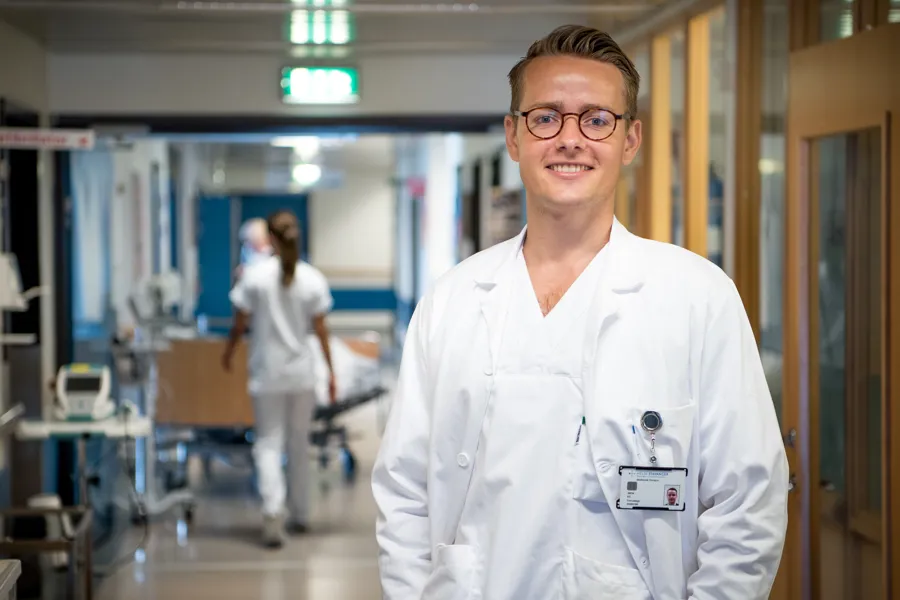Jens Vikse - new leader for NorTrials clinical immunology
Jens Vikse takes over as leader for NorTrials center for clinical immunology after Inger Marie Skoie. Skoie retains the professional responsibility for dermatology.

Photo: Svein Gabrielsen, Stavanger universitetssjukehus
Inger Marie Skoie has taken over the position as department head at the Dermatology Department at Stavanger University Hospital (SUS). As a result, she no longer has a formal affiliation with the Research Department at SUS, under which NorTrials center for clinical immunology is organized.
"I am therefore very pleased that Jens Vikse is taking over my function as center leader for NorTrials clinical immunology from March 1. He has had professional responsibility for rheumatology at our NorTrials center since April 2024, and will do an excellent job. I will continue for the time being as professionally responsible for dermatology for NorTrials," says Skoie.
A long rheumatology CV
Jens Vikse (35) received his medical education from Krakow, and graduated in 2016. Since then, he has accomplished a lot. He works as a senior physician at the rheumatology department at SUS, is a lecturer and subject responsible for immunology at the University of Stavanger, is working on a PhD on IgG4-related disease at the University of Bergen, and is engaged in rheumatology through clinical work, research, teaching, and communication. He has written two textbooks in rheumatology and immunology, runs the podcast Rheumatology and sits on various working groups both in Norway and Europe.
From March 1, he will add leader at NorTrials clinical immunology to his CV.
Wants to work for collaboration across disciplines
"I will still have the professional responsibility for rheumatology in NorTrials. Sondre Vatne Meling continues with professional responsibility for endocrinology, Inger Marie with dermatology, and in addition, we have coordinator Karianne Skogland Enerstvedt, who helps us a lot," says Vikse.
He continues in a 50% position as a senior physician in the clinic and 50% at the research department, where the latter is further divided between NorTrials and the Research Post.
"These jobs overlap partially anyway and will create good synergy effects. If we get an even closer collaboration with the Research Post, it will benefit both parties," says Vikse.
As leader of NorTrials center for clinical immunology, he wants to work to strengthen existing research collaborations, increase the number of trials, have good dialogue with the industry, ensure that inquiries are answered efficiently, and work to share experiences across centers and disciplines.
"We must try to get more healthcare professionals engaged and interested in participating in clinical trials, and we must talk to younger colleagues about the benefits of this, and that it feels meaningful to work with clinical trials," he says.
From rheumatoid arthritis to lupus
Within the field he works in, rheumatology, each individual diagnosis is relatively rare, but together they constitute a large group.
Rheumatologists today primarily work with inflammatory diseases. This includes joint diseases, such as rheumatoid arthritis, gout, spondyloarthritis (including psoriatic arthritis and axial spondyloarthritis (formerly called Bechterew's disease)). But also lupus, systemic sclerosis, and vasculitis diseases (blood vessel inflammation diseases).
"Common to all of these is that they are characterized by persistent or recurrent inflammation that can damage joints or other structures and organs. And they are chronic diseases, with all that entails," says Vikse.
Rheumatoid arthritis affects up to 1% of the population, gout 2%, and spondyloarthritis around 1%. The others, like lupus, are much rarer.
A phase 1 study is underway
Regarding clinical trials on these diseases, they have mainly been academic trials in Norway.
"In Norway, we have a long and good tradition in the rheumatology field of doing multicenter trials, but these have primarily been academic trials, and mainly under the auspices of the REMEDY center at Diakonhjemmet Hospital. Through NorTrials, I hope to be able to contribute to increasing the number of commissioned trials. This will, in addition to being a benefit for patients in itself, also give clinicians experience, knowledge and infrastructure that provides synergy effects for academic studies as well," says Vikse.
"Right now, we are in the start-up phase of a phase 1B trial, and we are just around the corner to start inclusion. Stavanger and Kristiansand are participating in the trial. In addition, we are waiting for a response to a feasibility study for yet another trial that we have given a positive response to. So we'll see if the company chooses Norway as a trial country for that one."
Hopes for a cure
Biological drugs have contributed to a significant improvement in the treatment of rheumatic diseases in recent years.
"From around 2000, there has been a major development in rheumatology treatment, when the first biological drugs – which selectively inhibit signals in the immune system – came. More and more biological drugs are being developed, and the indications are also expanding, so in Norway, we have good access to such medicines. The challenge with them is that they work by suppressing disease activity, but they don't cure the problem. In recent years, however, there has been a lot of talk about cellular precision therapy, e.g., CAR-T, where early reports show optimistic results for autoimmune diseases. Suddenly there is hope of a cure, which was utopian to talk about just a short time ago. So it's a very exciting field, with many studies on the way," says Vikse.